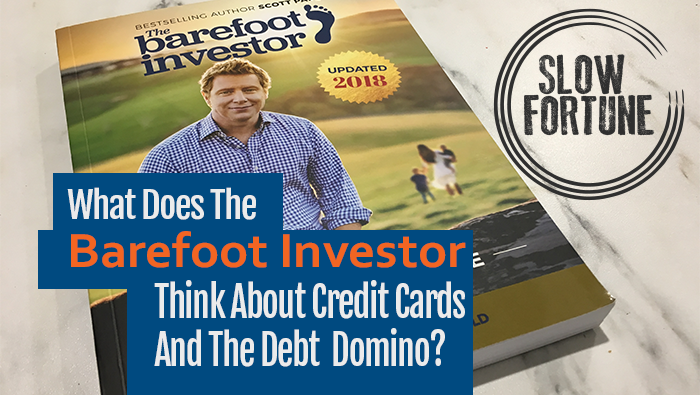
What Does The Barefoot Investor Think About Credit Cards And The Debt Domino?
Once you’ve set up your monthly Barefoot Date Night and Set Up Your Buckets, the third Barefoot Step is to Domino Your Debts. In this article we’ll look at what this means, I’ll discuss other strategies you can use to reduce your debt and give you my opinion on this strategy.
Scott Pape starts off this chapter by recounting his experience sitting before the Senate Parliamentary Enquiry into credit cards. He explains how he said that letting the Commonwealth Bank teach our kids about money was like letting Ronald McDonald teach our kids about nutrition.
Now, Scott is very good at giving out small snippets that he knows will get picked up in the media, and this is no different. And it’s difficult to disagree with this.
I’ve worked for a bank. I know what they’re like.
They normalise debt and make you think that being in debt is ‘normal’ and the way that everyone else does it.
But Scott continues the chapter by asking the question – “who taught you about money?”
And it’s a great question because the answer will probably help you understand more about the money biases you may have as an adult, because of the money messages you learnt as a child.
Maybe your parents taught you about money. That’s not automatically a good thing. It is if your parents had a good understanding of money and were able to teach you how to manage your own financial affairs.
But Scott points out the odds are that more than likely you learnt what not to do from watching your parents.
You may have been taught about money at school. But by who?
I know a lot of teachers who aren’t great with money. Some of them teach their students lessons about money.
Here in Australia CBA (Commonwealth Bank of Australia) has its Dollarmite school banking program. The concept is that it teaches kids how to save money.
The problem is the conflict it creates – they pay the school for each account that gets opened, plus a 5% commission on what the child deposits. Unfortunately, a lot of schools are cash-strapped and are always looking for ways to make more money. CBA provides that to them.
If you look at it, CBA is running this at a loss. Why would they do that? Because they understand the lifetime value of their customers.
There’s no chance they’ll be teaching the kids that it’s okay to not have a credit card. Or that saving up to buy a car is much better than taking out a car loan and paying interest on a car that will depreciate in value.
They’ll normalise debt because that’s where their profit is.
Scott hates credit cards and says he doesn’t have one. I know a lot of people who follow the Barefoot Investor strategies but do have a credit card. Most choose to repay it every month and use it for the rewards points. Scott isn’t a fan of this strategy but I believe it can be viable.
My bottom line is this – if there’s a product or service I can use that gives me some extra benefits without me having to change my spending habits, then I’m okay with that.
I use a credit card that provides rewards points. It does have an annual fee, but the value of the rewards we receive far outweigh the cost of the fee. And it gets repaid every month. And that’s the key – it only works because we repay it every month.
When I was younger (and working for a bank) I used to have a credit card and only pay the minimum amount every month. Most of the payment covered the interest I was being charged and a small bit went towards reducing the outstanding balance. If you don’t feel that you’re disciplined enough to pay a credit card off every month, don’t get one. Pay cash for everything – it’ll help you spend less.
Scott’s views on credit cards can be summed up by these two quotes:
Getting a credit card is like buying a dog. Once you get the card, the banks know it’s rare that you’ll give it up.
The biggest purchase you make on your credit card is interest.

How Do You Domino Your Debts Barefoot Investor Style?
The Barefoot Investor has a clear strategy to help you get rid of debt.
He suggests a five-step process:
- Domino 1 – Calculate
- Domino 2 – Negotiate
- Domino 3 – Eliminate
- Domino 4 – Detonate
- Domino 5 – Celebrate
Domino 1 – Calculate
This step is simple – make a list of all your debts including the amount owing, interest rate and monthly payments. Scott suggests that most people won’t even bother completing this step. Don’t be like most people.
Domino 2 – Negotiate
In this step, Scott recommends contacting each creditor and negotiating a better deal. The Barefoot Investor book gives you a script for this.
Domino 3 – Eliminate
Cut up your credit cards. Get rid of them so you won’t be tempted to use them again.
Domino 4 – Detonate
List your debts from lowest to highest. Use your Fire Extinguisher account (20 per cent of your pay) and direct it at your smallest debt. Then, once that’s repaid, direct it at the next-smallest debt. The strategy here is to have some quick wins by making progress on your smallest debts.
Domino 5 – Celebrate
When you repay your smallest debt, have a bill-burning ceremony. Scott suggests literally burning the bill/statement that relates to the debt you’ve just repaid.
Do this after you repay each debt – it’s satisfying and also important to symbolise the progress you are making.
Scott points out the whole point of the debt domino strategy is to give you confidence.
My friends ask me what I think about the debt domino strategy. Personally, I’m a fan of the Debt Avalanche strategy where the first debt you pay is the one with the highest rate of interest, not necessarily the lowest balance. Technically, this will result in you paying the lowest amount of interest.
However, I’m also aware that for many people, the biggest problem is motivation – getting motivated and staying motivated. With this in mind, a debt domino strategy is a good option because even though you’ll pay a bit more in interest overall, you’re probably more motivated because you’re seeing progress by paying off some small debts soon. If this gives you a higher probability of sticking to the strategy, then go for it.
What do you think? Have you used either of these methods to reduce debt? Do you have any questions about how to reduce your debt?
Leave a comment below and let me know what you think.
Download your FREE report - 5 Money Mistakes You Don't Realise You're Making
These money mistakes are costing you money and you probably don't even know you're making them.

0 Comments